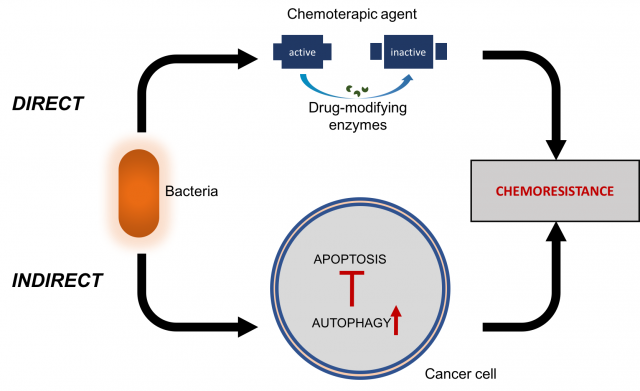Bacteria and cancer: the deadly mix
Chemo-resistance remains a leading cause of mortality in cancer. Two recent discoveries demonstrate that some bacteria strains induce chemo-resistance, and can be targeted to increase the efficacy of therapeutic agents.
The emerging relationship between the microorganisms and tumor progression has led many research groups to investigate whether the existence of a particular pattern of bacteria can influence clinical outcomes in patients 1. Two research groups have now provided new insights on how bacteria may induce chemoresistance in tumors 23.

Yu and colleagues used a novel approach to compare colorectal tissues from recurrent and non-recurrent cancer patients. The authors identified an increase in F. nucleatum in the chemoresistant tissues; F. nucleatum is a bacterium known to accelerate Colorectal cancer (CRC) 4.
The authors then performed a technique called RNA-seq to look at all RNAs in one shot and investigate potential tumorigenic pathways activated by F. nucleatum. The authors discovered a significant increase in the autophagy pathway, one of the key survival-mechanisms of cancer cells against the anti-tumor effect of chemotherapy. In fact, the authors showed that this bacterium has a unique ability to block apoptosis induced by chemotherapics Oxaliplatin and 5-FU.
Next, to elucidate the mechanism, Yu and colleagues performed a global micro RNA expression profiling of CRC tissues with high amounts of F nucleatum and discovered that miRNAs miR-4802 and miR-18a were downregulated. These miRNAs target specific regions of ULK1 and Atg7 RNAs, two key proteins of the autophagosome machinery. In vivo studies confirmed that the two miRNAs are essential for the autophagy-induced chemoresistance, since overexpressing the miRNAs reduced chemoresistance in Oxaliplatin or 5-FU treated mice.
Similarly, Dr Ravid Straussman in Israel, recently discovered that bacteria can directly neutralize gemcitabine, a drug used to treat several cancers including breast, ovarian, non-small cell lung, and pancreatic cancer. The group was investigating the relationships between dermal fibroblasts and chemoresistance, and they reported that when the fibroblast-conditioned medium was passed through a 0.45-µm filter, the resistance was completely lost.
DNA amplification and whole-genome sequencing studies identified the chemoresistance causing bacteria as Mycoplasma hyorhinis. A previous study demonstrated that the mycoplasma encoded enzymes, for example, cytidine deaminase (CDD) can compromise the cytostatic activity of gemcitabine in mycoplasma-infected tumors 5. Authors intravenously injected an E.coli strain, known to colonize tumors, into tumor-bearing mice and monitored the bacteria and cancer population through in-vivo luminescence imaging. Antibiotic-treated mice showed a marked increase in response to gemcitabine and this was due to reduced CDD activity.
The two studies summarized here showed two distinct mechanism that confer resistance: either directly though inactivation of the drug or indirectly via the autophagy pathway (see figure).
Despite these new fascinating players in the tumor microenvironment, the role of bacteria in human tumors has yet to be clearly demonstrated. However, the validation of these discoveries in the clinic open up the potential of new adjuvant therapies such as antibiotic treatments or bacterial enzyme inhibitors.
References
- Zitvogel, L., et al., Cancer and the gut microbiota: an unexpected link. Sci Transl Med, 2015. 7(271): p. 271ps1. doi: 10.1126/scitranslmed.3010473 ↩
- Yu, T., et al., Fusobacterium nucleatum Promotes Chemoresistance to Colorectal Cancer by Modulating Autophagy. Cell, 2017. 170(3): p. 548-563.e16. doi: 10.1016/j.cell.2017.07.008 ↩
- Geller, L.T., et al., Potential role of intratumor bacteria in mediating tumor resistance to the chemotherapeutic drug gemcitabine. Science, 2017. 357(6356): p. 1156-1160. doi: 10.1126/science.aah5043 ↩
- Kostic, A.D., et al., Fusobacterium nucleatum potentiates intestinal tumorigenesis and modulates the tumor-immune microenvironment. Cell Host Microbe, 2013. 14(2): p. 207-15. ↩
- Vande Voorde, J., et al., Nucleoside-catabolizing enzymes in mycoplasma-infected tumor cell cultures compromise the cytostatic activity of the anticancer drug gemcitabine. J Biol Chem, 2014. 289(19): p. 13054-65. ↩